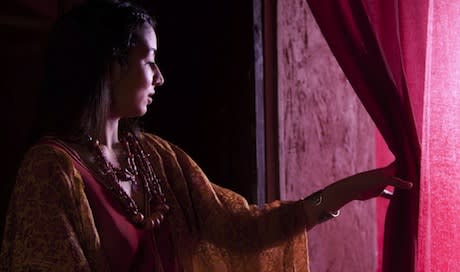Steeped in oblique symbolism, sensuous imagery and dense philosophical musings, Lahcen Zinoun's lyrical ode to the power of feminine mystique and chastisement of the deadly, spiteful archaic belief structures that fear the freedom of the female form is as confounding as it is beautiful.
By taking an abstract approach to narrative and infusing it with extremely insular mystical and religious jargon, Zinoun, who also wrote the script, demonstrates no desire to make his intentions accessible to outsiders. However, as impenetrable as it feels at times, there is plenty to be gleaned from the more universal themes of boldly challenging oppressive religious doctrine through acts of artistic expression and sexual freedom, and confusing the realms of fantasy and reality when swept up in transposing an idealized construct onto a flesh and blood inspiration.
Despite how it may sound so far, Written Woman isn't purely an arty sensory experience built around the intellectualization of emotion; there is a relatively clear and simple plot connecting Zinoun's sincere but somewhat pretentious five-movement story.
A director working on a film about the Berber poet and courtesan Mririda, Naim (Sam Kanater) is devastated when the beautiful, enigmatic woman he hired to play his famous muse, and who had since become his lover and wife, is murdered in the home they share while he was away on business. From there, the straightforward murder investigation is interspersed with flashbacks of Naim meeting the inscrutable, magnetic prostitute, Andjou and the fervent love that blossomed between them, along with clips of the highly stylized docudrama he was constructing.
The whodunit of it all is far less important than what Andjou meant to the various men in her life and how those men imposed their needs and desires upon the self-possessed identity she so closely guarded.
Deciphering the meanings of her mysterious body and face tattoos, some of which were burnt off with acid after she was stabbed to death, is a very deliberate act of misdirection on the part of both the character and Zinoun—it's what they represent that matters, not the specific translation.
That sentiment is true of this project as a whole. Rather than getting caught up in decoding the significance of every element, Written Woman is a film meant to be felt more than rationally understood.
(Ait Z)By taking an abstract approach to narrative and infusing it with extremely insular mystical and religious jargon, Zinoun, who also wrote the script, demonstrates no desire to make his intentions accessible to outsiders. However, as impenetrable as it feels at times, there is plenty to be gleaned from the more universal themes of boldly challenging oppressive religious doctrine through acts of artistic expression and sexual freedom, and confusing the realms of fantasy and reality when swept up in transposing an idealized construct onto a flesh and blood inspiration.
Despite how it may sound so far, Written Woman isn't purely an arty sensory experience built around the intellectualization of emotion; there is a relatively clear and simple plot connecting Zinoun's sincere but somewhat pretentious five-movement story.
A director working on a film about the Berber poet and courtesan Mririda, Naim (Sam Kanater) is devastated when the beautiful, enigmatic woman he hired to play his famous muse, and who had since become his lover and wife, is murdered in the home they share while he was away on business. From there, the straightforward murder investigation is interspersed with flashbacks of Naim meeting the inscrutable, magnetic prostitute, Andjou and the fervent love that blossomed between them, along with clips of the highly stylized docudrama he was constructing.
The whodunit of it all is far less important than what Andjou meant to the various men in her life and how those men imposed their needs and desires upon the self-possessed identity she so closely guarded.
Deciphering the meanings of her mysterious body and face tattoos, some of which were burnt off with acid after she was stabbed to death, is a very deliberate act of misdirection on the part of both the character and Zinoun—it's what they represent that matters, not the specific translation.
That sentiment is true of this project as a whole. Rather than getting caught up in decoding the significance of every element, Written Woman is a film meant to be felt more than rationally understood.
